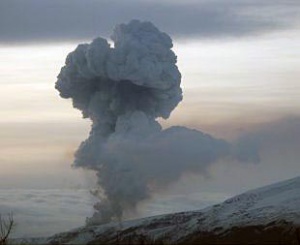Ash crisis sparks fears of double dip recession

The ash cloud could not have come at a worse time for airlines. The industry is losing around $200m a day. How much longer can the crisis go on before its sparks a double-dip recession, and airlines start going to the wall? BTN’s resident vulcanologist Adam Coulter investigates.
Airlines worldwide are estimated to be losing around $200m a day as the ban on flying due to the volcanic ash cloud remains in force.
It will be a week of virtually no flights, and airlines will have lost an estimated £910bn. That is on top of a predicted loss of £1.4bn this year, according to Iata.
What is terrifying for airlines and indeed the wider travel industry is that they are powerless to stop this.
The nearest comparable airspace shut down was 9/11, and although it was disastrous for the travel industry, it differed significantly from this disaster in that it was containable, manageable and man-made: everything this ash cloud is not.
ADVERTISEMENT
The ash cloud could not have come at a worse time for airlines, just as they were beginning to pull themselves out of a terrible 2009.
After the volcano erupted again, and if it continues to do so for a month – as the airlines enter their busiest trading period – we will see the first casualties.
The big carriers such as British Airways, easyJet, Ryanair, Air France and Lufthansa have substantial cash reserves, but they are burning through them.
BA estimates between £15m-£20m per day, easyJet £5m, Aer Lingus, €4m-€5m, SAS £4.6m-£8.2m per day (assuming the cancellation of all of its flights), BAA, operator of Heathrow, Stansted, Glasgow, Edinburgh, Aberdeen and Southampton airports, said it expected the current impact to be £5m-£6m and Tui Travel between £5m-£6m per day.
And governments will soon be called upon to help with a bail out.
It is extremely telling that BA – which strongly criticised the US government for propping up US carriers post-9/11 – has already stated it would be looking for a handout if the situation continues.
BA chief executive, Willie Walsh, said: “This is an unprecedented situation that is having a huge impact on customers and airlines alike.
“We continue to offer as much support as we can to our customers, however, these are extraordinary circumstances that are beyond all airlines’ control.
“To assist us with this situation, European airlines have asked the EU and national governments for financial compensation for the closure of airspace.
“There is a precedent for this to happen as compensation was paid after the closure of US airspace following the terrorist events of 9/11 and clearly the impact of the current situation is more considerable.”
So what is the worst case scenario?
If the disruption continues into the summer we will definitely see smaller airlines, tour operators and perhaps even private hotel chains go to the wall.
The larger companies will have to be propped up by the government and for many, it could simply be delaying the inevitable.
Britain, being an island, will be worse affected than other European countries – more than two-thirds of arrivals are by plane.
In the short-term, there is no way that Eurostar and the cross channel ferries will be able to lay on enough extra capacity to deal with demand.
It is not clear how this will play out, but unless National Air Traffic Service give the go ahead for flights to resume soon then any nascent recovery we’ve seen in travel and tourism this year will be over before it has even begun.
In terms of tourism, our big spenders – the Americans and Japanese – will be unable to get here and tourism receipts will fall dramatically as a result.
The Europeans will continue to travel and other sectors such as rail, coach and ferries will have a boom time.
However, the Europeans stay shorter and do not spend as much so without our long-haul visitors the deficit from inbound tourism will not be made up.

